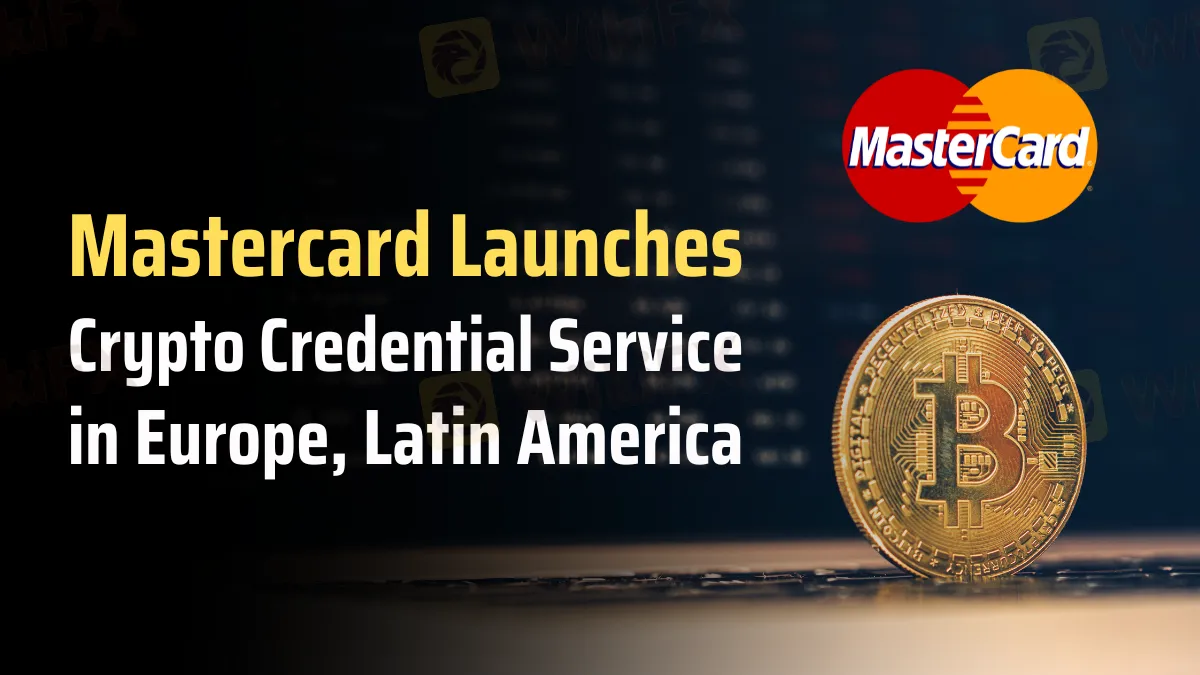简体中文
繁體中文
English
Pусский
日本語
ภาษาไทย
Tiếng Việt
Bahasa Indonesia
Español
हिन्दी
Filippiiniläinen
Français
Deutsch
Português
Türkçe
한국어
العربية
Mastercard Launches Crypto Credential Service in Europe, Latin America
Abstract:Mastercard rolls out Crypto Credential service in Europe and Latin America, simplifying cross-border crypto transactions and ensuring secure transfers.

Leading payment solutions company Mastercard has introduced a ground-breaking peer-to-peer cryptocurrency credential pilot program designed to make digital currency transactions easier. Targeting consumers who conduct both domestic and cross-border cryptocurrency transactions, this new service—known as Mastercard Crypto Credential—is now accessible in more than 10 countries around Europe and Latin America.
Increased Availability of Crypto
Through this effort, Mastercard hopes to simplify the complexity of conventional blockchain addresses so that customers may transfer and receive digital currency more safely. Accessible on well-known exchanges like Bit2Me, Lirium, and Mercado Bitcoin, the service allows for smooth transfers in Argentina, Brazil, Chile, France, Guatemala, Mexico, Panama, Paraguay, Peru, Portugal, Spain, Switzerland, and Uruguay.
Users of Foxbit and Lulubit will benefit from this integration as well, which will expand the network and provide public access to safe crypto transactions.
Innovations in Technology and Security
Executive Vice President of Product and Engineering for Latin America and the Caribbean at Mastercard, Walter Pimenta, underlined the significance of this breakthrough. “Mastercard keeps investing in its technology, standards, and alliances to bring safe, simple, and secure payments to the forefront,” he said. Delivering reliable and verifiable interactions across public blockchain networks is critical as interest in blockchain and digital assets keeps growing.

The Mastercard Crypto Credential system verifies connections between customers and businesses on blockchain networks. It guarantees users fulfill certain verification requirements, proving the recipient's wallet can handle the transmitted item. This makes the process of identifying supported assets and blockchains simpler and expedites the transaction.
Following Regulations
Mastercard Crypto Credential facilitates cross-border transactional information transmission in addition to transactional simplification. This guarantees that rules are followed, encouraging openness and deterring illegal activity.
Flexible Applications
Mastercard sees a lot of uses for its new service. Among them are tickets, different payment methods, and non-fungible tokens (NFTs). User registration results in an alias to enable transactions between supported exchanges and verification by Mastercard Crypto Credential requirements. To guarantee a seamless and safe transaction, the system verifies the recipient's alias and wallet compatibility during a transfer.
First-come, first-served access to the Mastercard Crypto Credential will be granted to a limited number of users of crypto wallets. Nonetheless, the initiative is expected to grow dramatically in the next months, with over 7 million subscribers across partner exchanges expected to be reached.
Final Thought
A major development in the field of virtual currencies is the launch of the Crypto Credential service by Mastercard. Mastercard is well-positioned to significantly influence the cryptocurrency scene in Europe and Latin America by making sending and receiving cryptocurrencies easier and guaranteeing security and regulatory compliance. This project not only meets the increasing need for safe and efficient cryptocurrency transactions but also prepares the ground for wider acceptance and creative uses in the digital asset market.
You access the latest news in crypto market here.

Disclaimer:
The views in this article only represent the author's personal views, and do not constitute investment advice on this platform. This platform does not guarantee the accuracy, completeness and timeliness of the information in the article, and will not be liable for any loss caused by the use of or reliance on the information in the article.
Read more

Russia to Fully Ban Crypto Mining in 10 Regions Starting January 1, 2025
Starting from January 1, 2025, Russia will implement a comprehensive ban on cryptocurrency mining in 10 regions for a period of six years. The ban will remain in effect until March 15, 2031.

Malaysia’s Crypto Landscape: Adapting Amidst Global Ambitions
The United States is intensifying its efforts to become a global cryptocurrency hub under President-elect Donald Trump. Experts believe this move could prompt countries, including Malaysia, to reassess their regulatory approaches toward digital assets.

SEC Approves Hashdex and Franklin Crypto ETFs on Nasdaq
The SEC has approved crypto index ETFs by Hashdex and Franklin Templeton, including Bitcoin and Ethereum, marking a milestone in crypto asset investment.

North Korean Hackers Steal $1.3bn in Cryptocurrency in 2024
Over $2.2bn in cryptocurrency stolen in 2024, with North Korean hackers accounting for $1.3bn. Discover how cyber theft impacts the evolving crypto landscape.
WikiFX Broker
Latest News
AIMS Broker Review
The Hidden Checklist: Five Unconventional Steps to Vet Your Broker
YAMARKETS' Jingle Bells Christmas Offer!
Why is there so much exposure against PrimeX Capital?
Russia to Fully Ban Crypto Mining in 10 Regions Starting January 1, 2025
MTrading’s 2025 "Welcome Bonus" is Here
Doo Financial Obtains Licenses in BVI and Cayman Islands
CFI’s New Initiative Aims to Promote Transparency in Trading
Currency Calculator



